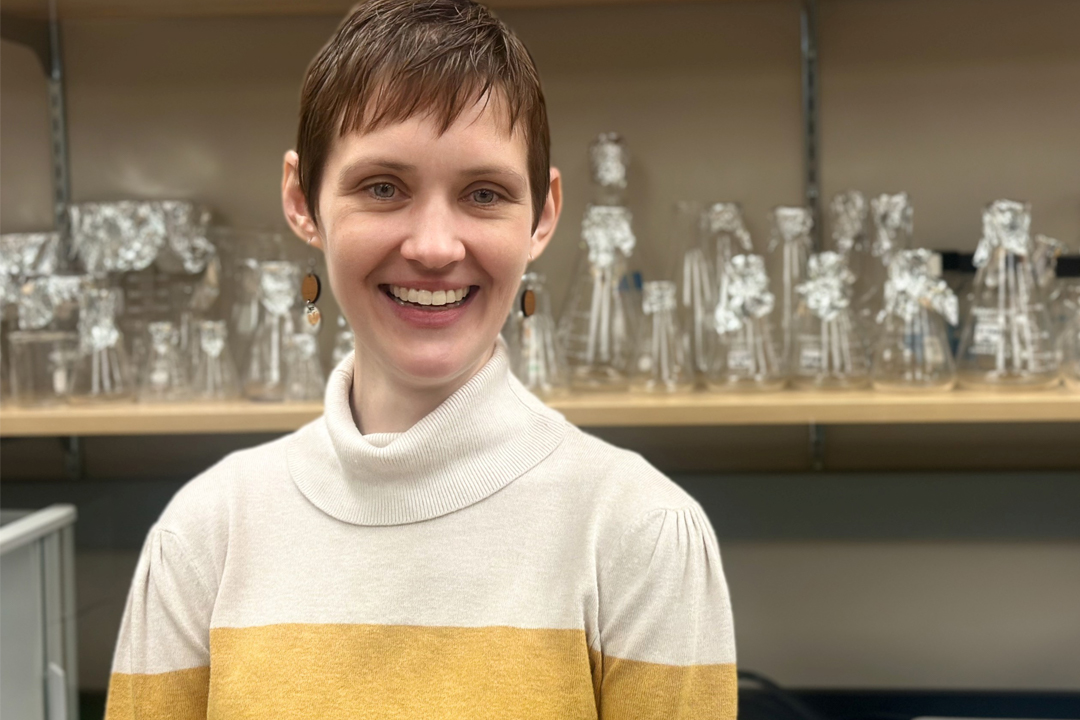
Thriving Against the Odds: Dr. Amanda Hall on Short Gut Syndrome
In the heart of the Health Sciences Building, Dr. Amanda Hall (MD) studies a tray of organoids under a microscope.
By Researchers Under the ScopeListen to all episodes of the Researchers Under the Scope podcast.
Researchers Under the Scope is produced by the Office of the Vice-Dean Research in the College of Medicine.
“They do need a lot of attention and a lot of feeding,” she said, pointing out dot-like points in a gel solution.
The pediatric surgeon and assistant professor of pediatric general surgery is using these organoids to identify factors that help infants overcome short gut syndrome.
The rare condition affects roughly 24 in every 100,000 babies born in Canada, presenting a profound challenge for infants born with insufficient intestinal length or compromised absorptive capacity.
“It’s a very, very long, difficult road,” said Hall. “Often they’re stuck in hospital and there’s no progress happening, so definitely [families] want another option.”
Hall’s interest in medicine took root in the 1990s in Meadow Lake, Saskatchewan, where her family's had three TV channels. In elementary school, she remembers faithfully recording the reality show Life’s Little Miracles, where a camera crew followed patients at Toronto’s Hospital for Sick Children.
“They’d actually go into the operating room and film the surgeries, which was amazing,” she said. “I decided that’s what I wanted to do.”
After she was accepted to the University of Saskatchewan’s College of Medicine, Hall met Dr. Grant Miller (MD) during her second year of residency. To become a pediatric surgeon, she had to earn her master’s degree, and Miller took the graduate student under his wing, focusing on parenteral nutrition-associated liver disease in infants.
“I just loved research,” said Hall. “I loved the struggle, the unending nights of work, then finally that amazing feeling when you see numbers that make sense.”
Together with Dr. Gordon Zello (PhD), this marked the beginning of Hall’s deep-dive into the intricacies of short gut syndrome, its underlying causes and potential treatments.
Right now, half of infants diagnosed with short gut syndrome get better on their own, with the help of IV nutrition. A few undergo complex bowel transplants, but close to 38 per cent succumb to the disease.
“[These infants] would have what we call failure to thrive,” said Hall. “They don’t gain weight, they have uncontrollable diarrhea, they might have vomiting.”
In this episode, Hall takes us inside her lab to see the miniature, spherical organs, cultivated from stem cells, mimicking the intricate structure of the human intestine.
“Definitely you become attached to them. They require a lot of work, a lot of time, and a lot of expense,” Hall laughed.
Hall's lab is exploring the potential benefits of breast milk and probiotics in encouraging growth inside these mini intestines. She hopes to identify specific components that could accelerate the recovery of infants suffering from short gut syndrome.
“We know that breast milk …. helps with our immune function, helps with the actual integrity of the bowel. I’m curious to know does it actually help the bowel grow faster?”
For families grappling with the challenges of short gut syndrome, Hall's work represents a beacon of hope.
“The idea of finding a universal cure is not very realistic,” said Hall. “But if we can start identifying different factors to help and improve the process, that’ll be very important.”
She says there are a multitude of factors that affect infants with short gut syndrome, with some medications already in development.
“There’s definitely hope on the horizon,” she said.
(Runs: 24:13)
